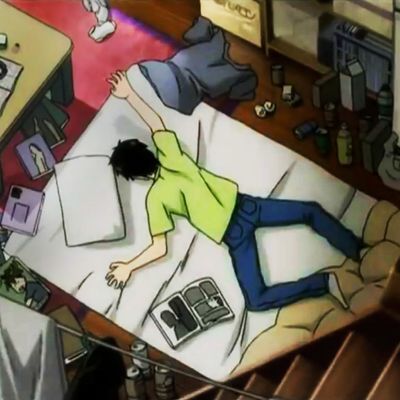
Luca lives with his parents outside of Charlotte, North Carolina, though he might as well live anywhere. That’s because the only times the 21-year-old leaves his room is to buy Camels, which he smokes in his garage. Mostly he spends his time in his room posting on Reddit, gaming, and watching anime. He sleeps all day, wakes up at six in the evening, and pops Benadryl around nine in the morning so he can go back to sleep. He’s been reliving the same exact day — almost every day — for close to a decade.
All of this, he told me over Reddit DMs, started at age 12. He’d get so anxious in class that he’d forget how to swallow, so his mom let him take online classes instead. Eventually he dropped out of online high school, too. At 15, he discovered Welcome to the N.H.K. — an anime about a broadcasting company’s conspiracy to manufacture a generation of shut-ins — which provided Luca with a term that he felt gave a philosophical justification for the way he lives his life. “Instead of the world telling me to go to school and get a job, I quit school and decided to go on a personal rebellion,” he told me. “I learned of the term hikikomori and realized that was me and that was what I am.”
In 1978, a researcher named Yoshimi Kasahara first described cases of ordinary Japanese people with an anxiety so extreme that they were shutting themselves in their rooms. It was unclear why these patients were exhibiting what he called “withdrawal neurosis” at the time, and we’re not really much closer to untangling whatever biological or social conditions (higher levels of uric acid?) that might cause what the Japanese have called hikikomori, which translates to something like “pulling inward,” since the late ’80s or so. Some hikikomori — which is used as both a noun and an adjective, like alcoholic — seemed to be reacting to the expectation that they would enter into a single job and remain there until retirement. Unable or unwilling to cope with what’s known as salaryman culture, they avoided society entirely.
By 2003, there were enough people who could be diagnosed with the condition that the Japanese Ministry of Health, Labor, and Welfare published a 141-page white paper defining the term. According to the official governmental report, hikikomori show no interest in personal development or friendship for more than six months but don’t meet the criteria of schizophrenia or “other mental disorders.” In 2016, a government survey found evidence of 541,000 hikikomori living in a country of 127 million people.
For years, hikikomori was thought to be a “culture-bound syndrome” — something so specifically Japanese that it could never appear beyond its borders. That concept has since fallen out of favor, and now one researcher named Alan Teo believes that something similar is cropping up in the States — that American hikikomori now comprise a distinct, socially challenged subset of the people not in education, employment, or training (often called NEETs). Teo first learned about hikikomori while studying in Kyoto, and when he eventually started his practice in the Bay Area, he began translating literature about the concept into English. In 2010, he was contacted by the mother of a 30-year-old man he calls “Mr. H.” She was seeking help for her anime-loving son, who had come across one of Teo’s translations and diagnosed himself. Teo encouraged Mr. H. to come by his office at the University of California in San Francisco for treatment, despite the fact that would mean stepping outside for the first time in three years.
Mr. H. wore a leather jacket that reeked of cigarette smoke, had mangy hair, didn’t shower, and had long fingernails. “During the first and most severe year, he remained within a walk-in closet, ate only-ready-to-eat food, did not bathe, and urinated and defecated in jars and bottles,” Teo would later write in the International Journal of Social Psychiatry. “He passed the time surfing the internet and playing video games.” Tests run on Mr. H showed seemingly conflicting results. While he exhibited traits consistent with obsessive compulsive and schizoid personality disorders, various scales and inventories concluded he had neither. Mr. H. claimed his reclusiveness was based on something pretty simple: He just didn’t want to be a part of the world, which is both what hikikomori in Japan had long said and basically what Luca told me.
“We have a large number of people [in the United States] in their early 20s living in the basement bedroom,” Teo told me. “Often times it is younger men. Struggling with work. Struggling with launching. There is some element of still being stuck in an earlier developmental stage, like that of an adolescent, even though their physical age is that of an adult.”
Statistics certainly suggest that there’s an underemployment crisis among young people in the United States: The Economic Policy Institute put that rate among recent college graduates at 12.6 percent. Some researchers have suggested that recreational computer use — including increasingly life-consuming video games — accounts for somewhere between 23 and 46 percent of the decrease in young men’s participation in the labor force. (Others regard that finding with skepticism.) One could convincingly argue that NEETdom is a logical response to the fact that the average college graduate in 2016 came out of school about $37,172 in debt — something that may be impossible to pay off with menial labor at, say, a local fast-food place. If you’re slated for a life of crippling debt, and you can get all of your social needs met online, then why even bother working? For his part, Luca thinks: “I refuse to work for $8 at Taco Bell and be another’s lackey when I am my own god.”
According to a 2015 Pew study, about 10 million NEETs exist in the United States, though statistics break down when you try to get much more granular than that in terms of maladjusted men — Carnegie Mellon University professor Simon DeDeo did some back-of-the-napkin math using U.S. census data to put the number of incels (the self-chosen name for “involuntary celibates,” young misogynists who gather online to commiserate at their lack of romantic or sexual attachment) at an estimated 700,000. Teo can’t come up with a number of how many hikikomori there might be in the United States, though he’s personally assessed ten Americans he believes suffer from it as part of his formal research and says that he hears from someone “almost like clockwork every month” who is concerned that they or their family member fits the definition.
Meanwhile, anecdotal evidence that people are, at least, choosing to identify as hikikomori abounds online. There are, for instance, subreddits, such as r/hikikomori, where roughly 2,000 people gather to discuss anime and gaming, as well as ways to obtain money from the government without leaving their rooms. YouTube videos with names like Top 10 Ways to Make Money as a Hikikomori rack up comments, and sections of 4chan, such as R9K, are notorious posting grounds for English-speaking, anime-obsessed, socially incompetent NEETS.
It’s difficult to medically classify hikikomori — though it’s not in the Diagnostic and Statistical Manual — it’s probably best to think about it as a folk illness like evil eye. After all, hikikomori definitionally can’t exist in everywhere: An illness that causes you to lock yourself in your own bedroom makes sense in Japan or America — or even a developing nation like Oman, where there’s been at least one documented case — but it’s much harder to imagine it happening to many people in, say, certain nomadic areas of Mongolia where people live in communal tents.
However, given that the norms and idioms of a particular culture influence how people describe their symptoms, it’s worth considering how noncommunicable diseases can be spread on the internet and whether or not what scientists now call a “cultural syndrome” as opposed to a “culture-bound syndrome” can even exist in the age of Reddit. Prior to the invention of the internet, it’s unclear how a kid in North Carolina like Luca would have even stumbled across that anime he was telling me about — Welcome to the N.H.K., about the heroic NEET. He definitely wouldn’t have found a community of other angsty teens who decided their unhealthy habits made them part of a subculture. Mr. H. wouldn’t have found Teo, and I wouldn’t have found Alvin, who lives with his mother in Flushing, Queens.
When it came time to apply for college, Alvin got so anxious that he would hide in the bathroom during class. He hasn’t left his home, which his mother bought with family money, since dropping out about four years ago. Like Luca, the 22-year-old discovered a term online that he felt explained the condition he felt he’d been suffering from since birth. “I pretty much fit right into that name, so I have called myself a hikikomori ever since,” he told me over Reddit when we first started messaging back in July.
That summer, his goal was to drive for Uber, because it would allow him to take breaks whenever he wanted. But after seven months of being unable to leave the house, he instead ending up taking his own taxi to the emergency room. Alvin went to a psychiatric hospital, and then to an outpatient program where he was eventually assigned a social worker. She wanted to get him gainful employment, as well as the wherewithal to accomplish some simple goals, such as checking out Hudson Yards and maybe a few museums.
When I checked in with Alvin six months later, he told me about an ill-fated job with Target. There have been some slight wins: He’ll leave the house solely to go grocery shopping or to work out at his local YMCA, though only for those reasons, and he still considers himself hikikomori. It’s unclear if he’ll slide back to where he was when we met online. After all, despite the fact that throughout course of about 25 counseling sessions, Mr. H. was deemed in remission and ended up getting a part-time job, Teo told me he since relapsed. For his part, Luca says he gave the world one last chance after meeting a girl on Twitter a few years back, though decided to never leave the house again after she broke his heart.
No matter what they call themselves, or why they decide to shut themselves away from the world, a generation’s worth of extreme shut-ins would potentially portend disaster for the American economy. The so-called “2030 problem” in Japan refers to the approximate point at which many parents of the first generation of hikikomori will hit their 60s. What social safety net could the government realistically provide for people who haven’t gone outside — nevermind worked — for decades? As of last year, Japan was funding more than 50 community support centers for hikikomori. Meanwhile, Americans are newly obsessed with unproductive young men, though there hasn’t been much research on how to help them. Teo’s spent the years since those first sessions with Mr. H in search of a definition of hikikomori that’s consistent across cultures. In October 2018, he published a 25-item questionnaire that asked participants to what degree they related to statements such as, “People bother me” and “There really is not anyone very significant in my life.” The ensuing data showed “robust psychometric properties and diagnostic accuracy” among an initial sample of about 400 Japanese adults. He’s hoping he can at least help other clinicians start to think about these issues.
In the meantime, Luca survives off the disability checks his mother — also a “home-staying person” — receives. He hopes that government will develop a treatment plan for American hikikomori as well as social programs to help support them as they transition into the working world. But for now he says that the only things he misses about normalcy is being able to buy his own cigarettes and the panoply of lottery tickets he used to stare at while the cashier rang up his smokes. He’s desperate for companionship, but he says he would rather die homeless than end up serving hamburgers. It’s better, he thinks, to spend his nights surfing Reddit in a Benadryl haze.
“There’s no asshole boss in my room standing at my door going, ‘Wash those walls for six hours, then you can take 15 minute break by laying in your bed,’” he told me. “It’s the opposite of a prison. It is freedom. There’s no one in here but me. I can do whatever, whenever. Going outside is a prison. But this room — this room is clarity.”





























